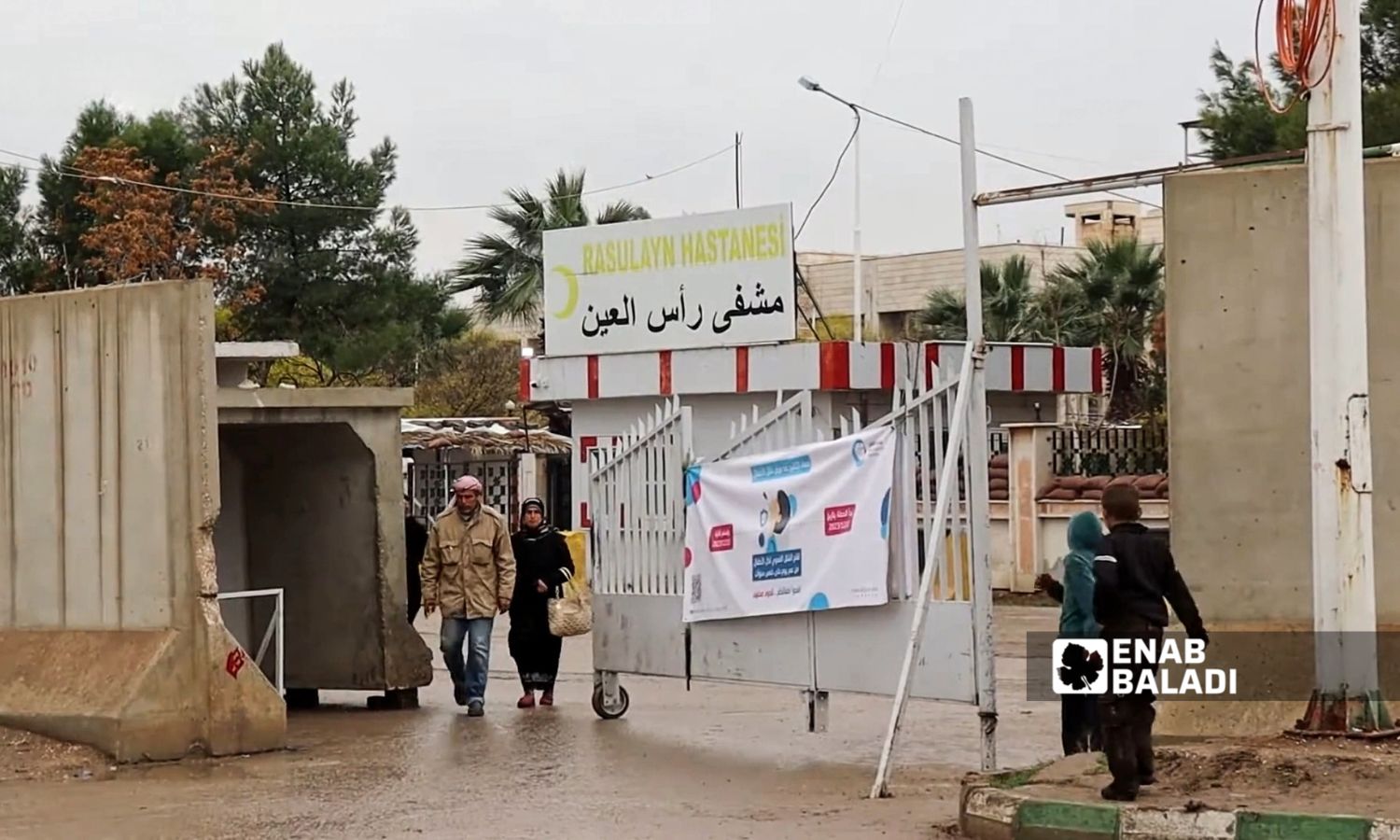



Enab Baladi – Ras al-Ain
For the past five years, the residents of Ras al-Ain, in the northwestern part of al-Hasakah, have been facing a severe shortage of specialized pediatric doctors due to the limited geographical area and the lack of land routes to northern Syria, in addition to the preference of doctors to work in areas with higher wages and more freedom of movement.
Parents of sick children are forced to wait for long hours in the only hospital in the city, the National Hospital, which only has two doctors. This number is insufficient to meet the needs of the city and its vast countryside.
Some have resorted to traveling long distances to the cities of Suluk or Tal Abyad (about 120 kilometers away) to secure treatment, adding a financial burden and exhausting families.
Ibrahim al-Mohammed, from the village of Hamid east of Ras al-Ain, took his child (eight months old) to the National Hospital after he suffered from severe chest infections, hoping to receive appropriate treatment.
Al-Mohammed had to wait for long hours in the hospital due to the shortage of specialized doctors but was unable to secure a consultation, and his child’s health deteriorated significantly.
After losing hope of receiving appropriate care at the hospital, the father went to a pharmacy to get medication. After two weeks of treatment, his child died from an overdose of medication.
Mrs. Shamsa al-Gharima mentioned that her three-year-old daughter suffers from gastrointestinal problems and was unable to get the appropriate treatment due to the absence of pediatricians in private clinics in Ras al-Ain, where they are limited to the overcrowded National Hospital.
As her child’s condition worsened, al-Gharima had to travel to Tal Abyad, where she saw a specialist who discovered, after a thorough examination, that the illness had worsened to a dangerous level, threatening her child’s life.
She added to Enab Baladi that the doctor referred her daughter to Turkey for surgery on her gastrointestinal system, as the illness had progressed to require urgent intervention to save her life.
Patients visiting the hospital suffer due to the lack of specialists in surgery, obstetrics, pediatrics, cardiology, and internal medicine, as this shortage causes delays in providing crucial medical services, which can sometimes lead to the deterioration of patients’ conditions or even death.
A medical source at the National Hospital (who requested anonymity) said that the lack of willingness among doctors to work in the city is due to insufficient support and low wages.
He explained to Enab Baladi that the difficulty of bringing medical equipment to private clinics due to the siege imposed on the area makes it hard to provide the necessary tools for appropriate care.
Moreover, economic conditions drive many doctors to work in other areas where opportunities are better and wages are higher.
The source noted that one pediatrician at the hospital (out of two) examines between 100 and 150 children daily at the National Hospital, which is a large number affecting the accuracy of health assessments.
He stated that the only solution lies in incentivizing doctors through enticing financial offers or facilitating border crossing procedures from the Turkish side, especially regarding the needs of doctors coming from Syria.
The National Hospital faces immense pressure as it is the only public hospital in the region and is the main destination for the majority of the population, who rely on its vital services, according to civilians from the city who spoke to Enab Baladi.
The spokesperson for the local council, Ziad Malaki, told Enab Baladi that the council is working to provide the necessary facilities for doctors in Ras al-Ain.
He mentioned that a special financial grant is available for doctors working in the National Hospital and that their passage to Turkey is being secured.
He added that the council, through its Health Directorate, will work on attracting doctors from northern Syria to Ras al-Ain in the upcoming period, providing all necessary facilities for opening their clinics or working in the National Hospital.
He noted that patients who need examination or treatment are referred to Tal Abyad at the expense of the National Hospital, and in emergency cases, they are transferred to Turkey.
The Ras al-Ain National Hospital, which is considered the main healthcare facility for the city’s residents, faces challenges related to a shortage of medical staff and some specialties, in addition to the significant pressure it is under.
Compared to the northern Aleppo area, Ras al-Ain is facing a “severe” shortage of support and lives in a condition akin to “siege and isolation,” hindering efforts to provide the necessary support for the medical sector.
In a previous report prepared by Enab Baladi, it was noted that there are no eye doctors available in Ras al-Ain, which places a burden on patients needing preliminary examinations or surgical procedures.
Additionally, most residents in Ras al-Ain directly go to pharmacies to diagnose some illnesses and obtain pain-relieving medications that assist in treatment, despite the risks associated with incorrect diagnoses and not providing the appropriate medication.
if you think the article contain wrong information or you have additional details Send Correction